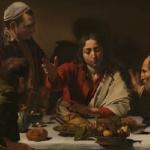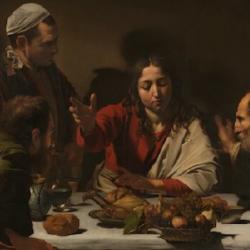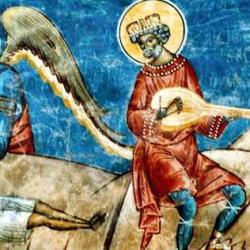We can fill out Paul’s exhortation to give thanks for all things in all circumstances concretely by bringing it more explicitly into connection with the liturgy of the todah and the Eucharist. Giving thanks is a pattern of acknowledgement, recital, memorial, and feast. Or: we give thanks when we take, bless, break, and distribute. How might that translate into a daily Eucharistic liturgy?
*Acknowledge this thing, experience (good or bad), person as a gift from a loving heavenly Father, from whom are all things.
*Ask: How can I incorporate this thing, this experience (good or bad), this person into a recital of God’s great acts for me and for his people?
*Ask: How can I memorialize this thing, experience, person? How can it become a “reminder” to God to be faithful and an aid to my memory?
*Ask: How can my encounter with this experience, thing, or person become communion with God, an act of covenant renewal? How can I this person come to share thanksgiving with me?
*Ask: How can my response to this thing, experience, person be a continuing witness to the goodness, faithfulness, and justice of God? How can my response become an assault on powers and principalities in heavenly places?
*Ask: How can I receive this thing, experience, person so as to break and distribute it for the nourishment, edification, and joy of others? How can I bring others to share in my thanks?
It might be thought that the person or thing that I receive is elided when gratitude is directed to God, but that need not be the case. My gratitude to God is gratitude to the God who has made this person or thing, 0r providentially orchestrated these particular circumstances. My thanksgiving is inflected as thanks for this specific person or thing. On the other hand, I appreciate and give thanks the particular person, thing, or experience in their irreducible particularity because he, she, or it comes from God. My love for a person is not simply deflected or projected onto God. My gratitude to God and my love for the person are both deepened by the fact that the two coinhere.
By denying that thanksgiving is an emotion, this model might seem to bypass the specific problems posed by this colloquium. We give thanks to God even in sorrowful circumstances, insofar as we acknowledge that the sorrow originates from our loving Father, seek ways to incorporate into a recital of God’s mighty acts, and creatively explore how to turn it to the good of God’s kingdom and the benefit of others.
Yet, the Bible often associates joy and thanks (Pss 42:4; 95:2; 107:22), and joy is an obvious emotional accompaniment of the acts of deliverance that evoke todah. If the practices of thanksgiving are accompanied by expressions of joy, how can we “give thanks for everything in all circumstances”? How does that not degenerate into avoidance of responsibility or collusion with injustice? How does it not, as Anthony Kronman charges, eliminate the legitimacy of complaint?[1]
Three theological observations will ease if not resolve this dilemma. First, as noted above, thanksgiving takes place within a covenant context. It is an acknowledgement of God’s faithfulness to covenant, which gives rise to an occasion for a covenant-renewing feast. Covenant obligations, however, cut both ways; David responds to YHWH’s deliverances with thanks and a communion meal, and reacts to YHWH’s apparent failures with desperate complaints. These complaints do not arise from distrust but from trust (apparently) betrayed: “You said you would deliver me, and I trusted you. You have failed me.” Most of these complaints end in thanks and praise, as YHWH comes through at last to fulfill his promises. But even before the Eucharistic denouement, David’s complaints operate within the same covenant space as his thanksgiving. The same covenant that is renewed in thanksgiving opens room for complaint.
Second, the substance of covenant life has been radically modified by the cross. Thanks and joy have become cruciform. It has become possible to give thanks and rejoice not in spite of but because of suffering. After a flogging by the Jewish leaders, the apostles follow Jesus’ instructions (Matt 5:12) and “went on their way . . . rejoicing that they had been considered worthy to suffer shame for His name” (Acts 5:41).[2] Even when suffering is not so directly a result of being a disciple, it can be suffering “in Christ,” insofar as it taken, broken, and distributed for the edification of others.
To put this in a Eucharistic idiom: At the table, we give thanks by incorporation into the thank-offering that Jesus presented on the cross. At the heart of that thank-offering is the cry of dereliction, the lament or complaint to the absent Father. As we commune in the thank-offering of Christ, we are incorporated also into his lament, confident that ours, like his, will at last be turned to joy.
Finally, the eschatological dimensions of the new covenant come into play. In the Psalms, joy and thanks frequently come at the end of a sequence of events. David is threatened, YHWH rescues, and David rejoices with todah. Even in the Old Testament, thanks is offered prospectively, because YHWH’s hesed endures forever (Ps 136). In some Psalms, thanks immediately follows a cry for help (Pss 28:1-8), and Psalm 40 begins in thanksgiving and ends with a prayer for help.[3] Gripped by confidence in the covenant loyalty of YHWH, ancient Israelites gave thanks for demonstrations of covenant loyalty that have not yet occurred.
This future-present is intensified in the new covenant. At the heart of the gospel is the announcement that the end has invaded the middle, the future broken into the present. Jesus is risen, and so the eschatological event has already begun. The Spirit of the risen Christ comes as the Spirit of the age to come. Already we enjoy the fulfillment of what is not yet. And for this reason, thanks and joy invade our sorrows; the light of coming day brightens the night. Deliverance is so utterly certain – it is in fact a past event, a happened not a will happen – that we can already give thanks for a rescue that is still future.
Conclusion
Within these parameters, we might be able to make sense even of thanksgiving for a poisoned gift, a gift given with the intention of demeaning, shaming, or enslaving. Even such a gift comes ultimately from the Father from whom are all things, and we can rely on the Father to repay the giver justly. Even such a gift can become a means of communion with the Father in his Son, and can be used to bless others. God claims even such a gift as we sanctify it through word, prayer, and thanks.
And we can certainly make sense of gratitude in the midst of brokenness and sorrow. Let me offer one specific example. The daughter of a colleague at my former college was diagnosed with a rare and often fatal cancer at a young age. She survived and is now married, but during the early years of her illness her parents accepted this calamity with courage, prayed fervently for healing, complained and lamented, trusted God. They continued to gather Sunday after Sunday with the church to praise the God who did not protect their daughter from cancer. By their sheer steadiness encouraged untold hundreds of near and distant observers. They took this disaster in hand, blessed God in the midst of their pain, broke and distributed their sorrow to build up the body of Christ.
That is thanksgiving. That is a tamid todah, a life drenched in Eucharist.
This is the final installment of a paper prepared for a consultation on gratitude, joy, and complained at the Yale Center for Faith and Culture, September 8-9, 2017.
[1] Confessions of a Born-Again Pagan, 93-94.
[2] Citing the General Thanksgiving from the 1979 Book of Common Prayer, Robert C. Roberts observes: “If the virtue of gratitude is the disposition to feel grateful to the right person, for the right thing, at the right time, then Christian gratitude is the disposition ‘above all’ to feel grateful to God for the gift of his Son, at all times. And this orientation to the Father and the Son affects one’s emotional sense of all the ordinary blessings, as well as the tribulations, of daily life. It gives one a distinctive Christian wisdom, a power of discrimination, in which the category of blessings expands and the remaining evil is held in the perspective of God’s greatest gift” (Roberts, “The Blessings of Gratitude,” in Emmons and McCullough, eds., The Psychology of Gratitude, 73).
[3] Pao, Thanksgiving, 119-126.












